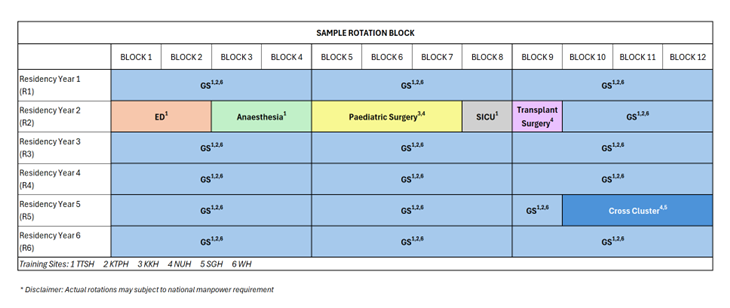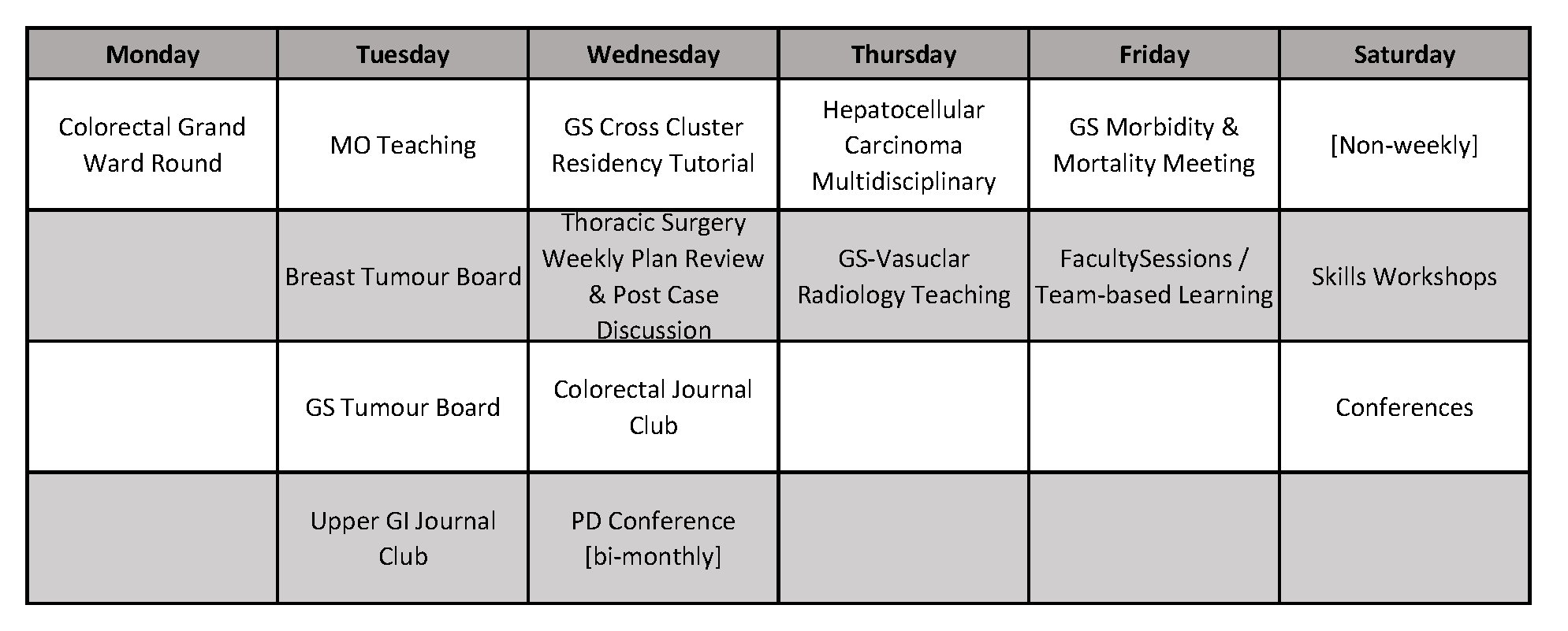Curriculum
Residency training begins with three years of foundational development in the principles of surgery and systemic surgery. During this period, the resident trains in various aspects of general surgery and surgical critical training. Junior residents learn to perform simple and moderately complex surgical procedures under the direct or indirect supervision of the faculty.
Subsequently, the resident advances to three years of senior residency training, which focuses on various subspecialties in surgery.
Under our training, a graduating resident will possess advanced surgical skills and will be capable of independently performing all procedures in the specialty, including complex and rare procedures.
 Extensive Operative Experience
Extensive Operative Experience
The resident will train at major hospitals in Singapore with high surgical volume and a comprehensive variety of cases. Trainings conducted at these hospitals provide residents with unrivalled opportunities to gain knowledge and practical experience in a wide spectrum of acute and elective surgical conditions. Experienced faculty will also supervise the resident's training. In general, the resident will have to complete a minimum of 750 cases across all primary components of General Surgery at the end of Residency Year 6.
Developing Future Faculty
With a strong teaching culture in TTSH, KTPH, and WH, the resident will have opportunities to teach and mentor medical students, junior staff, and other healthcare providers. This allows the resident to develop as a clinical teacher during his/her residency training. Over the years, many of our residents have won teaching awards for their contributions to the training of junior clinicians.
Robust Evaluation System
The programme's qualified and dedicated faculty anchors its robust formative and summative assessment system. In our programme, each resident is assessed with regular workplace-based assessments and provided with timely feedback.
Rotations
Core rotations include general surgery, surgical critical care, hepato-biliary-pancreatic surgery, colorectal surgery, trauma surgery, breast and endocrine surgery, head and neck surgery, upper gastrointestinal tract and bariatric surgery, vascular surgery, advanced laparoscopic and endoscopic surgery, paediatric surgery, transplant surgery as well as surgical oncology.
To widen his/her exposure, the resident can rotate to other surgical-related specialties such as paediatric surgery, and thoracic surgery.

Academic Activities and Research Opportunities
In addition to developing the science and art of surgical practice, our structured curriculum and focused clinical activities support the resident in other areas. These areas include acquiring and improving his/her knowledge and practice of patient safety, communication skills, evidence-based medicine, ethics, clinical quality improvement, and professionalism. The programme also provides the resident with ample research opportunity, ranging from collaborations at the intra-departmental to the inter-institutional levels. He/she can participate in healthcare research in order to advance the understanding of patient care, disease management, and health services improvement.

SAFETY & TEAMWORK IN THE OPERATION THEATRE (STOR)
In 2013, the STOR (previously named as OT Orientation) programme was introduced to provide junior residents and nurses with proper knowledge of working effectively and safely in the OT environment. This half-day course takes place at the TTSH Integrated Simulation and Training Advancement Centre (SIMTAC) where participants learn from didactic teaching, case scenarios, and simulations. Course objectives include developing junior residents’ knowledge in critical work processes of a surgical team in complex clinical environments as well as managing potential adverse events related to surgical procedure.
SYSTEMS & TEAMWORK IN THE EMERGENCY MANAGEMENT IN SURGERY (STEMS)
The STEMS programme is an intensive 2-day workshop. It focuses on Clinical Systems, Teamwork, and Emergency Management in Surgery, ultimately aiming to develop junior residents’ knowledge, skills, and capability in various facets of acute surgical care.